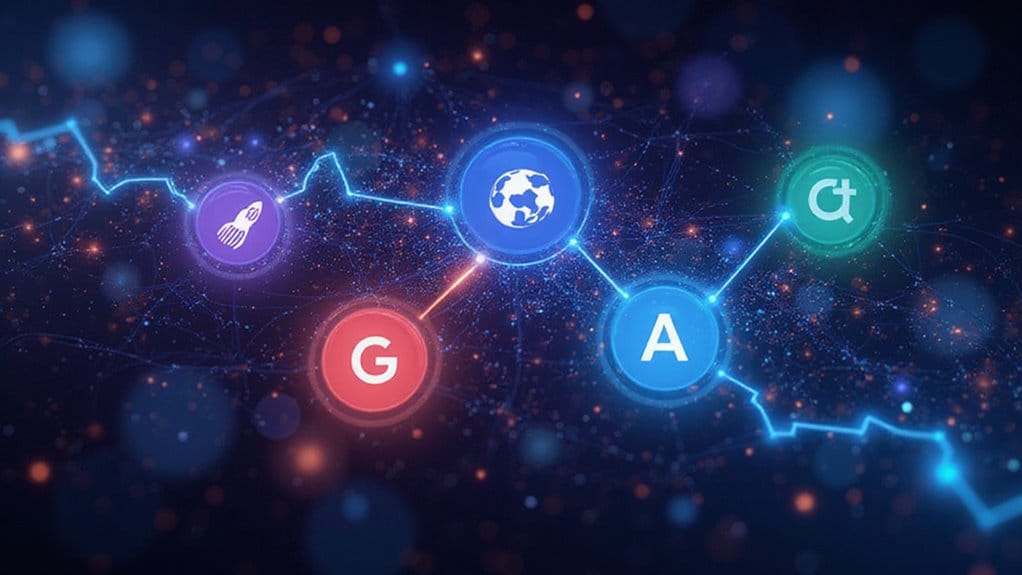Artificial Intelligence (AI) terminology can seem overwhelming, but fear not! AI includes everything from Narrow AI (think virtual assistants) to the ambitious goal of Artificial General Intelligence (AGI), which wants to think like us. Ethical dilemmas? Yup, they’re a big deal, especially when machines make choices. And let’s not forget Machine Learning (ML), where computers learn from data. Want to understand more about this tech wizardry? Stick around, because there’s a lot more to unpack!

Artificial Intelligence (AI) is not just a buzzword; it’s the brainy technology shaping our future. From the moment John McCarthy coined the term in 1955, AI has evolved into a fascinating field that encompasses everything from simple tasks to complex intelligent systems.
Now, let’s not get lost in jargon. Simply put, AI refers to machines designed to think and act like humans—at least in the ways that matter most.
AI is all about creating machines that think and act like us, focusing on what truly matters.
When diving into AI, one must first understand its types. Narrow AI focuses on specific tasks—think of your trusty virtual assistant. On the other hand, Artificial General Intelligence (AGI) aspires to match human cognitive ability across various domains. Imagine a robot that can not only play chess but also cook your favorite meal. Now, that’s a game-changer!
But here’s where it gets even trickier. As AI technologies grow, so do the ethical questions surrounding them. Enter AI Ethics, where the moral implications of intelligent systems come into play. How should we use AI responsibly? What happens when AI makes decisions that affect lives? These aren’t just abstract questions; they’re crucial for guiding the future of AI.
Another essential piece of the puzzle is Machine Learning (ML), a subset of AI that enables computers to learn from data. This is where the magic happens. With various learning types—like supervised and reinforcement learning—machines can adapt and improve over time. Additionally, the importance of training data cannot be understated, as it plays a vital role in enhancing machine learning capabilities. Moreover, algorithmic efficiency helps ensure that AI systems utilize resources optimally during their learning processes.
And let’s not forget about Deep Learning, which mimics how our brains work, diving deep into neural networks to solve complex problems.
Finally, Natural Language Processing (NLP) allows machines to understand and interact with human language. Ever chatted with a bot? Thank NLP for that experience! It’s a critical bridge between humans and machines, ensuring effective communication.
Frequently Asked Questions
How Does AI Impact Job Markets Globally?
AI is shaking up job markets worldwide, and not in a good way. Job displacement is real, with millions at risk.
But wait! Skill evolution is the silver lining—new roles demand fresh skills. So, get ready to adapt!
Embrace learning in AI programming or data analysis. It’s not just about survival; it’s about thriving.
Don’t sit back and hope for the best—take charge and prepare for the future, or risk getting left behind!
What Ethical Concerns Surround Artificial Intelligence?
Artificial intelligence raises several ethical concerns that demand attention.
Privacy implications lurk as data collection grows, risking your personal information.
Pay attention to accountability issues; who’s responsible when AI messes up?
Transparency challenges make it hard to trust these systems.
Don’t forget algorithmic fairness—bias detection is essential to guarantee everyone gets a fair shake.
And let’s not even start on surveillance concerns that could have Big Brother watching you.
Stay informed!
Can AI Learn From Human Emotions?
AI can indeed learn from human emotions, bolstering its emotional intelligence and making it more relatable.
Imagine a chatty robot that can recognize when you’re upset—pretty cool, right? Through empathy training, AI analyzes facial expressions and speech to adapt its responses.
But beware! It’s not perfect. Misinterpretations can happen, so don’t expect your toaster to comfort you after a breakup.
Keep an eye on these developments; they’re evolving fast!
How Is AI Regulated in Different Countries?
AI regulation varies wildly across nations. The European Union leads with legislation focused on safety and ethics, while the U.S. juggles over 120 bills—good luck keeping track!
Compliance frameworks differ, and regulatory challenges abound, especially concerning data privacy. Countries like Canada and China are crafting robust guidelines, yet ethical standards remain a tangled web.
What Are the Future Trends in AI Development?
Future trends in AI development are shaping up to be a wild ride!
Expect autonomous systems to take center stage, performing tasks without your constant supervision.
Predictive analytics will also level up, helping businesses make smarter decisions faster.
So, buckle up! As AI advances, it will redefine how we work and interact.
Stay informed, or risk being left behind in this tech revolution.
Seriously, don’t miss out—your future self will thank you!









